Last week, in her column “If So InKlined,” Rebecca Kline, an 18-year-old American citizen, announced to the whole school that she had not voted in the election November 4. Her apathy is not shocking—only 51.3 percent of eligible voters in Minnesota actually voted this year, a figure still higher than the abysmal nation-wide figure of 36.3 percent. What was truly shocking was Kline’s unblinking ownership of her failure to vote, proclaiming it in the pages of The Mac Weekly and actually going so far as claiming victimization for it. That Kline and many others should so easily neglect their duty as citizens and forego voting is more than a casual mistake: it’s a disturbing trend that could spell trouble for American democracy.
Any citizen, especially an informed, passionate Macalester student, should never be proud of a decision not to vote founded in apathy. Kline’s excuse of being new to Minnesota and not knowing much about local politics rings true for the majority of Macalester students. However, in today’s world of smartphones and constant connection, it takes less time to Google “who is Al Franken?” than it does to brush your teeth. If computers are too impersonal, find a friend who knows what’s going on—I’d be happy to help. If you legitimately do not have the time for research or do not feel comfortable voting in an unfamiliar state, you can still request an absentee ballot from home. Because of these abundant resources, not voting because you don’t know Minnesota politics is little more than a convenient excuse.
Kline, however, goes beyond the usual lack-of-information line to boldly claim her right not to vote. She misinterprets the hallowed American right to vote as “the freedom to vote or not to vote.” To me, this reeks of entitlement—has she forgotten the suffragists who fought long and hard to secure her that right, or the brave leaders of the Civil Rights movement who weathered countless attacks in their quest for equal access to the ballot box? In this context, the equation of the right to vote with the freedom not to vote is a brutal affront to centuries of effort. Kline’s choice to forgo voting, and that of many others, is a disappointing demonstration of complacency and entitlement among Americans today.
Worse yet, Kline’s claim of a right not to vote is blatantly untrue. Yes, voting is a right, but it is more importantly a duty that rests on every single eligible citizen. As American citizens, we are part of a contract with our government whose terms are pretty sweet. In exchange for education, healthcare, legal protection, a stable economy and so much more, all we have to do is provide our input with a vote. Although it may seem like a burden, the simple act of walking to the polls is a small price to pay for so many benefits. Not to do so is an unacceptable breach of the contract between government and its citizens.
My passion for this issue stems from my work as an organizing leader with the DFL’s coordinated campaign this fall. Yes, I was one of the students with a clipboard canvassing in the days leading up to the election, and I’m sorry if I bothered you on your way to class. Surprisingly, I dislike canvassing just as much as you dislike being canvassed—no one wants to sit outside in the cold all day pestering their fellow students. However, I still canvassed for countless hours before this election, and I probably will continue to do so for the next election, and the one after that. Why? Because I believe in the importance of voting and want to give my peers as many tools as possible to exercise that right and perform their duty as citizens.
So, when Kline claims that my colleagues and I made her “feel bad for not voting” she has a point. She should feel bad for not voting, and so should everyone else who neglected to do so. They have ignored the grueling struggles of civil rights crusaders, violated a contract with their government and, in a small way, undermined the foundations of American democracy. If even Macalester students, supposedly the most educated, politically informed, passionate people around, think it’s cool to skip voting, then I have serious doubts about the efficacy of the American political process. For something so venerable to be brought down by apathy and a misguided sense of entitlement would be a tragedy. I would rather share in the success of the American democracy than share in its failure. Wouldn’t you?





Vanessa Davies • Sep 9, 2019 at 7:35 pm
The very crux of your writing while appearing agreeable originally, did not really sit well with me personally after some time. Somewhere throughout the sentences you were able to make me a believer but just for a short while. I nevertheless have a problem with your leaps in logic and you might do well to fill in all those breaks. In the event you can accomplish that, I could undoubtedly be impressed.